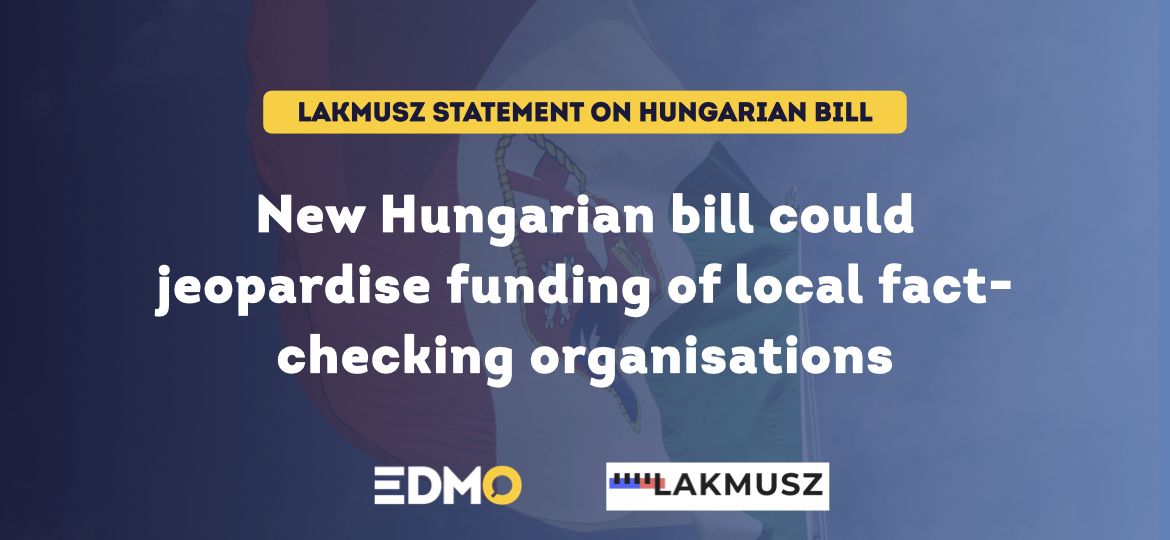New Hungarian bill could jeopardise funding for local fact-checking organisations
The following statement has been released by Lakmusz, the largest anti-disinformation and fact-checking media outlet in Hungary. Lakmusz is part of the International Fact-checking Network (IFCN).
Can it happen in an EU member state that the government cuts off independent media and NGOs from the funds they need to operate, because of what they think and write?
This is what’s at stake with a newly proposed bill – officially called ‘transparency in public life’, but in reality neatly fitting into a series of stigmatising foreign agent laws – tabled in the Hungarian parliament on 13 May and expected to be voted on by MPs in the first half of June.
The draft law gives the government the power to draw up a list of “foreign funded” organisations it considers to be a threat to Hungary’s sovereignty, by an arbitrary decision that cannot be challenged in court. Inclusion on the list would entail severe financial and other restrictions. The Hungarian Tax Authority would, among other things, monitor the bank accounts of listed organisations with the assistance of banks, investigate their foreign transactions and ultimately block access to foreign funds if it finds that they are ‘used to influence public life’. Existing foreign contracts of listed entities would become, by law, impossible to fulfil.
The law, if passed, will threaten the entirety of the independent press and civil society in Hungary, and it will pose a heightened risk for the operation of Lakmusz. Lakmusz, Hungary’s first and only dedicated fact-checking site with a considerable reach, was launched as part of the Hungarian Digital Media Observatory (HDMO) with the support of the European Commission in early 2022. Since then, the Commission’s grants for the fight against disinformation have been our main source of funding, but we have also won several other grants – all of them in open competition, in recognition of the quality of our work. We implement these projects transparently, in the interest of the public.
Thanks to our effective work, the interest of our readers and our successful grant applications, Lakmusz’s financial situation is stable for the foreseeable future, provided that the government does not prevent us from accessing the funds we have already been awarded and that are, in many cases, already covered by legally binding contracts. If, however, the law is applied in such a way that we are cut off from all grant funding already won as well as from future grants, the very existence of Lakmusz will be jeopardised. Our articles are available free of charge, we do not display advertisements on our site, and as a media independent of the government we can hardly hope to receive domestic funding. In our case, therefore, the withdrawal of foreign funding would mean losing 100% of our income.
Today, it is uncertain how long we would be able to maintain our editorial staff in its current form and size, even though our publisher is committed to continuing fact-checking journalism.
In its 3.5 years of existence, Lakmusz has published more than 800 articles. Thanks to our collaboration with 444.hu, our most read articles have reached more than 50,000 readers each. In the run-up to the 2024 European Parliament and local elections, we checked 46 political claims that appeared in paid social media ads, and found that Meta and Google generated around half a million euros in revenue from disinformation ads in Hungary.
Our donors have never had any influence on the content of our articles or our editorial decisions. As a member of the International Fact-Checking Network (IFCN) and the European Fact-Checking Standards Network (EFCSN), we work with a transparent and audited methodology. Supporting Lakmusz influences Hungarian public life only in the sense that it contributes to maintaining independent journalism and fact-checking.
As we wrote in a joint statement by media organisations and NGOs, this draft law is the most serious attack to date on the remaining independent institutions in Hungary. We expect European decision-makers, especially the European Commission, to use all available means to ensure that this law will not be adopted or, if it is adopted, that it does not prevent independent media and NGOs from operating. The Commission has the possibility to seek an interim measure before the Court of Justice of the EU to suspend the law should it enter into force, or to seek ways to further support Hungarian independent media and civil society.
Anyone who cares about independent journalism and fact-checking, please share this message and make your voice heard.
